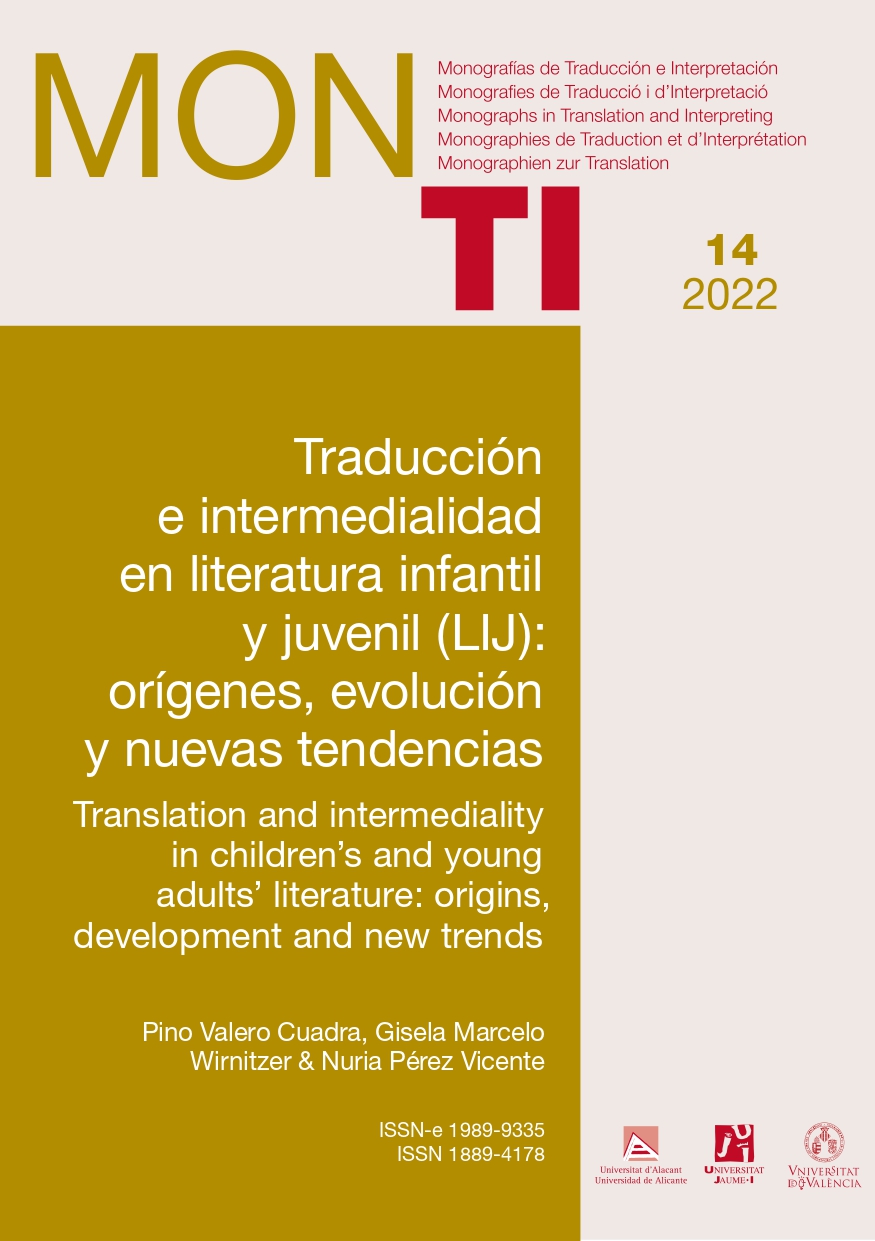Translation of ethnic stereotypes and gender discrimination in children literature: Mary Poppins’ chapter ‘Bad Tuesday’
Main Article Content
Abstract
Pamela Travers rewrote the sixth chapter of Mary Poppins (“Bad Tuesday”) twice in response to criticism of its discriminatory content and language. The book was banned for this reason in the San Francisco public library system in the 1980s. This is a study of the Spanish translation of the first version of the chapter, published in Spain in the first decade of Franco’s dictatorship and still included in the current edition. The stereotypical depiction of non-white ethnicities in both languages and contexts will be discussed, together with the use of taboo words and unequal treatment of men and women in a children story.
Downloads
Article Details

This work is licensed under a Creative Commons Attribution 4.0 International License.
The documents contained in these directories are included by the contributing authors as a means to ensure timely dissemination of scholarly and technical work on a non-commercial basis. It is understood that all persons copying this information will adhere to the terms and constraints invoked by each author's copyright. These works may not be reposted without the explicit permission of the copyright holder.
References
ARIZA, Mercedes (2014). Estudio descriptivo de las traducciones para doblaje en gallego, catalán, inglés e italiano de la película Donkey Xote (José Pozo, 2007) y propuesta preliminar teórico-metodológica para el análisis de textos audiovisuales de doble receptor. Vigo: Universidade de Vigo. Tesis doctoral inédita. Versión electrónica: <http://www.investigo.biblioteca.uvigo.es/xmlui/bitstream/hand-le/11093/1257/Ariza_Mercedes%20TD%202014.pdf?sequence=1&isAllowed=y>
BARÓ LLAMBIAS, Mònica. (2005) Les edicions infantils i juvenils de l’editorial Joventut (1923-1969). Barcelona: Universitat de Barcelona. Tesis doctoral inédita.
BIRD, Betsy; Julie Danielson & Peter Sieruta. (2014) Wild things! Acts of mischief in children’s literature. Somerville: Candlewick Press.
BLACK, William. (2018) “How watermelons became black: emancipation and the origins of a racist trope.” Journal of the Civil War Era 8:1, pp. 64-86.
BROWN, Alexander. (2019) “African American enslavement, speech act, theory and the law.” Journal of African American Studies 23, pp. 162-177. Versión electrónica: <https://doi.org/10.1007/s12111-019-09431-z>
COLE, Johnneta. (1970) “Culture: negro, black and nigger.” The Black Scholar 1:8, pp. 40-44.
CONNEW, Paul. (1981) “Mary Poppins, prohibida en San Francisco”. El Diario de Burgos 22/11/1980, p. 17. Versión electrónica: <https://bibliotecadigital.jcyl.es/i18n/catalogo_imagenes/imagen.cmd?path=10349120&posicion=1®istrardownload=1>
CRISTÓFOL Y SEL, María Cruz (2008). “Canon y censura en los estudios de traducción censurada: algunos conceptos y pautas metodológicas para la investigación.” Trans 12, pp. 189-210. Versión electrónica: <http://www.trans.uma.es/pdf/Trans_12/t12_189-210_MCCristofol.pdf>
DOMÍNGUEZ PÉREZ. Mónica. (2008) Las traducciones de literatura infantil y juvenil en el interior de la comunidad interliteraria específica española (1940-1980). Santiago de Compostela: Universidade de Santiago de Compostela. Tesis doctoral.
FAIRCHILD, Halford. (1985) “Black, negro or Afro-American? The differences are crucial!” Journal of Black Studies 16:1, pp. 47-55.
FERNÁNDEZ LÓPEZ, Marisa. (2000) “Comportamientos censores en la literatura infantil y juvenil: traducciones del inglés en la España franquista.” En: Rabadán, Rosa (ed.) 2000. Traducción y censura, inglés-español 1939-1985: e-studio preliminar. León: Universidad de León, pp. 227-253. Versión electrónica: <https://buleria.unileon.es/handle/10612/4697>
FERNÁNDEZ LÓPEZ, Marisa. (2007) “Comportamientos censores en la literatura infantil y juvenil traducida del inglés en la época franquista: establecimiento de un corpus textual.” En: Merino Álvarez, Raquel (ed.) 2007. Traducción y censura en España (1939-1985). Estudios sobre corpus TRACE: cine, narrativa, teatro. Bilbao: Universidad del País Vasco & Universidad de León, pp. 19-48.
HUGUET, Montserrat. (2013) “Memoria del primer franquismo. Mujeres, niños y cuentos de infancia.” En: Cagnolati, Antonella. 2013. Tessere trame, narrare storie. Le donne e la scrittura per l’infanzia. Roma: Aracne, pp. 123-150.
LIGERO, Manuel. (2019) “Mary Poppins y el viento del Este.” La Marea 08.02.2019. Versión electrónica: <https://www.lamarea.com/2019/02/08/mary-poppins-y-el-viento-del-este/>
LORENZO, Lourdes (2014). “Paternalismo traductor en las traducciones del género infantil y juvenil.” Trans 18, pp. 35-48. Versión electrónica: <http://www.trans.uma.es/Trans_18/Trans18_035-048_doss2.pdf>
MARTÍN FERNÁNDEZ, Carmen (2018). “De la traducción de la literatura infantil a la traducción de series para niños: estudio de las normas de un corpus audiovisual francés.” Çédille 14, 323-345. Versión electrónica: <https://www.ull.es/repp. vistas/index.php/cedille/article/download/1616/1105/>
N.N. (1980) “People.” The Sentinel 17/10/1980, p. 3. Versión electrónica: <https://digitalassets.lib.berkeley.edu/sfbagals/Sentinal/1980_SFS_Vol07_No21_Oct_17.pdf>
PASCUA FEBLES, Isabel. (1999) “La adaptación dentro de la traducción de literatura infantil.” Vector plus 13, pp. 36-47.
PASCUAL GARRIDO, María Luisa. (2001) Un hito en la poesía inglesa traducida en antologías: estudio descriptivo de la poesía inglesa (1945-1948) de Marià Manent (1923-1969). Córdoba: Universidad de Córdoba. Tesis doctoral inédita.
PILGRIM, David. (2000) “The pickaninny criature.” Jim Crow Museum of racist memorabilia. Versión electrónica: < https://www.ferris.edu/HTMLS/news/jimcrow/antiblack/picaninny/homepage.htm>
PILGRIM, David. (2012) “The Golliwog Caricature.” Jim Crow Museum of racist memorabilia. Versión electrónica: <https://www.ferris.edu/jimcrow/golliwog>
SCHWARTZ, Albert. (1974) “Mary Poppins revised: an interview with P.L. Travers.” Interracial Books for Children 5:3, pp. 1-4
SLAVOVA, LINA. (2021) “Bad Tuesdays with Mary Poppins.” The Mary Poppins effect. Blog. <https://themarypoppinseffect.com/2021/01/18/bad-tuesdays-with-mary-poppins>
SWARTCH LORENZO, Elvira. (2019) “4 razones porque los pajes negros de Alcoy son violencia.” <https://afrofeminas.com/2019/12/21/4-razones-porque-los-pajes-negros-de-alcoy-son-violencia-2>
TRAVERS, Pamela & Borja García Bercero (tr.) (2002/2014) Mary Poppins. Madrid: Alianza.
TRAVERS, Pamela & Marià Manent (tr.) (1943) Mary Poppins. Barcelona: Juventud.
TRAVERS, Pamela & Marià Manent (tr.) (1962/2017) Mary Poppins. Barcelona: Juventud.
TRAVERS, Pamela. (1934/1963) Mary Poppins. New York: Reynal & Hitchcock.
TRAVERS, Pamela. (1934/1998) Mary Poppins. Hammersmith: Harper Collins.
TRAVERS, Pamela. (1953) The magic compass. Newa York: Simon & Schuster.
TRAVERS, Pamela. (1972) Mary Poppins. New York: Scholas-tic.
TRAVERS, Pamela. (1978) “I never wrote for children.” The New York Times 2/7/1978. Versión electrónica: <https://www.nytimes.com/1978/07/02/archives/i-never-wrote-for-children.html>
TRAVERS, Pamela. (1981) Mary Poppins. New York: Harcourt Brace & Company.
TRAVERS, Pamela. (1982) “A letter from the author.” Children’s literature 10p, p. 214-217.
VALERO CUADRA, Pino & Antonio Lérida Muñoz. (2019) “La fuerza de los estereotipos: la traducción de la LIJ desde una perspectiva inclusiva.” E-Aesla 5, pp. 423-431.


